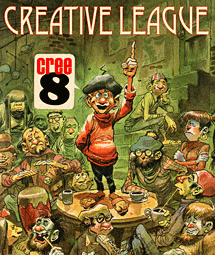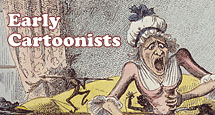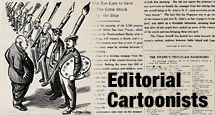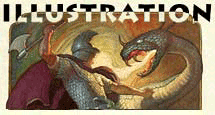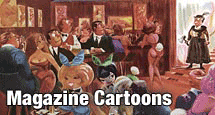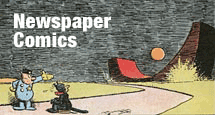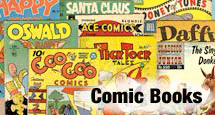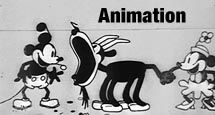This posting is a stub. You can contribute to this entry by providing information through the comments link at the bottom of this post. Please organize your information following the main category headers below….
Birth/Death
Birth 1910, Williston, N.D.
Death: Feb. 17, 2001, Van Nuys, CA
Occupation/Title
Writer-producer
Bio Summary
John Sutherland produced a variety of animated films under the studio which bore his name, although his studio focused primarily on documentaries and industrial films sponsored by the large American corporations of his time. A graduate of UCLA, Sutherland began his career as a writer on Walt Disney’s Bambi, and later produced live-action military training films during WWII. He produced what is considered to be his most lavish animated production, Rhapsody of Steel, for U.S. Steel under his own company in 1959.
Early Life/Family
John Elliot Sutherland was born in 1910 in Williston, N.D., and raised in Montana. As an adult, he was once married to Paula Winslow, who voiced Bambi’s mother in the 1942 film. He is survived by three sons: Eric of Chicago, John of Midlothian, Va., Ronald of Coral Gables, Fla.; and a daughter, Diane Leggett of Elkins Lake, Texas.
Education/Training
Sutherland graduated from UCLA in 1937 with a degree in politics and economics.
Career Outline
Sutherland met Walt Disney while working as director of UCLA’s drama and debate department. This meeting led Sutherland to a brief career at the Disney Studios as an assistant director and story director from 1938 to 1940. He is also credited as a writer on Bambi (1942). During WWII, Sutherland produced live-action training films for the military, a successful commission that led to the formation of John Sutherland Productions in Los Angeles in 1945. Sutherland produced the Daffy Ditties shorts for United Artists before moving into corporate and industrial films, a lucrative field that became the studio’s primary source of output during the mid-1940s to the mid-1960s. ?Sutherland produced about 20 films a year, and had a pool of sponsors that included General Electric, Kaiser Aluminum, DuPont, U.S. Steel, and the New York Stock Exchange, to name a few. Some of the studio’s more notable films include A Is for Atom (1953), It’s Everybody’s Business (1954), Destination Earth (1956), and Working Dollars (1957). Sutherland’s epic, Rhapsody of Steel (1959), was produced in Technicolor and set to a score by composer Dmitri Tiomkin and performed by the Pittsburgh Symphony Orchestra. In 1972, he produced a series of 50 short films for the Captain Kangaroo show.
Comments On Style
The style of the Sutherland studio films differ from one another in degrees, depending on the particular director or layout artists who worked on a given film. John Sutherland tended to distance himself from the artistic process of his films, rather focusing his efforts on the story and script. Having said that, several notable stylists worked at the Sutherland studio at one point or another: Eyvind Earle, of Sleeping Beauty fame, art directed Rhapsody of Steel; Maurice Noble provided styling for It’s Everybody’s Business; and Bernard Gruver created layouts and characters for Working Dollars.
Influences
John Sutherland Productions, along with many of the other major animation studios of the 1950s, were heavily inspired by the fine artists, illustrators, and graphic designers of the day. Some of these artists include Ronald Searle, Stuart Davis, Saul Steinberg, and Martin and Alice Provensen.
Personality
Sutherland was financially generous to his employees. The studio offered some of the highest paying salaries in the industry.
Anecdotes
John Sutherland provided the voice of the adult Bambi in the 1942 film of the same name.
Miscellaneous
Animator Bill Melendez once worked at the Sutherland studio, earning up to $250 a week.
Filmography
The Cross-Eyed Bull (1945)
The Lady Said No (1946)
Daffy Ditties: Pepito’s Serenade (1946)
Choo Choo Amigo (1946)
The Flying Jeep (1946)
The Fatal Kiss (1946)
Secrecy of American Prosperity (1947)
Little Boy And His Dog (1947)
Chiquita Banana (1947)
Chiquita Banana Convinces The Cannibals (1947)
Chiquita Banana Helps The Pieman (1947)
Chiquita Banana Goes North (1947)
Chiquita Banana’s Star Attraction (1947)
Chiquita Banana’s Fan (1947)
Chiquita Banana On The Air (1947)
Chiquita Banana’s Reception (1947)
The Counterfeiters (1948)
The Strange Mrs. Crane (1948) ?Make Mine Freedom (1948)
Lady at Midnight (1948)
Going Places (1948)
Chiquita Banana’s School For Brides (1948)
Chiquita Banana’s Beauty Treatment (1948)
Chiquita Banana Makes A Better Breakfast (1948)
Chiquita Banana Tells A Fortune (1948)
Chiquita Banana Wins A Medal (1948)
Why Play Leap Frog? (1949)
Meet King Joe (1949)
The Butcher, The Baker and The Ice Cream Maker (1950’s)
Employee Relations (1950’s)
Albert In Blunderland (1950)?Inside Cackle Corners (1951)
Fresh Laid Plains (1951)
What Makes Us Tick (1952)
A Is for Atom (1953)
The Atom Goes To Sea (1954)
It’s Everybody’s Business (1954)
The Littlest Giant (1955)
Your Safety First (1956)
Destination Earth (1956)
Working Dollars (1957)
Rhapsody of Steel (1959)
The Wise Use of Credit (1960)
A Way Out of the Wilderness (1968) ?
Honors
Time Magazine once praised Sutherland as “a slick entertainer and a painless pedagogue.”
Related Links
http://www.archive.org/search.php?query=john%20sutherland%20AND%20collection%3Aprelinger (Public Domain Examples of the Sutherland Studio’s Films)?
Bibliographic References
Amidi, Amid. Cartoon Modern: Style and Design in Fifties Animation. San Francisco: Chronicle Books LLC, 2006.
Internet Movie Database (IMDB). Accessed 02 November 2008.
BIO-AAA-410
Contributors To This Listing
Chris
To make additions or corrections to this listing, please click on COMMENTS below…?





